ACC305 Accounting Theory: IFRS Adoption, US GAAP & Global Standards
VerifiedAdded on 2023/06/05
|11
|3798
|326
Essay
AI Summary
This essay examines the key issues surrounding the adoption of International Financial Reporting Standards (IFRS) in the United States, comparing it with US Generally Accepted Accounting Principles (GAAP). It explores the factors influencing the adoption or discouragement of IFRS, including the differences between principle-based IFRS and rule-based US GAAP, the potential loss of US influence on accounting standards, and the costs associated with switching. The essay also discusses the perceived benefits of IFRS adoption for US governments, investors, and preparers, such as increased comparability of financial statements. Furthermore, it analyzes the debate on standardizing accounting standards, including the roles of free-market and regulatory approaches. The essay highlights the ongoing discussion regarding the harmonization of accounting standards through IFRS adoption and considers whether the implementation of accounting standards should be mandated or left to market forces. This essay provides a comprehensive overview of the complexities and implications of IFRS adoption in the US context.
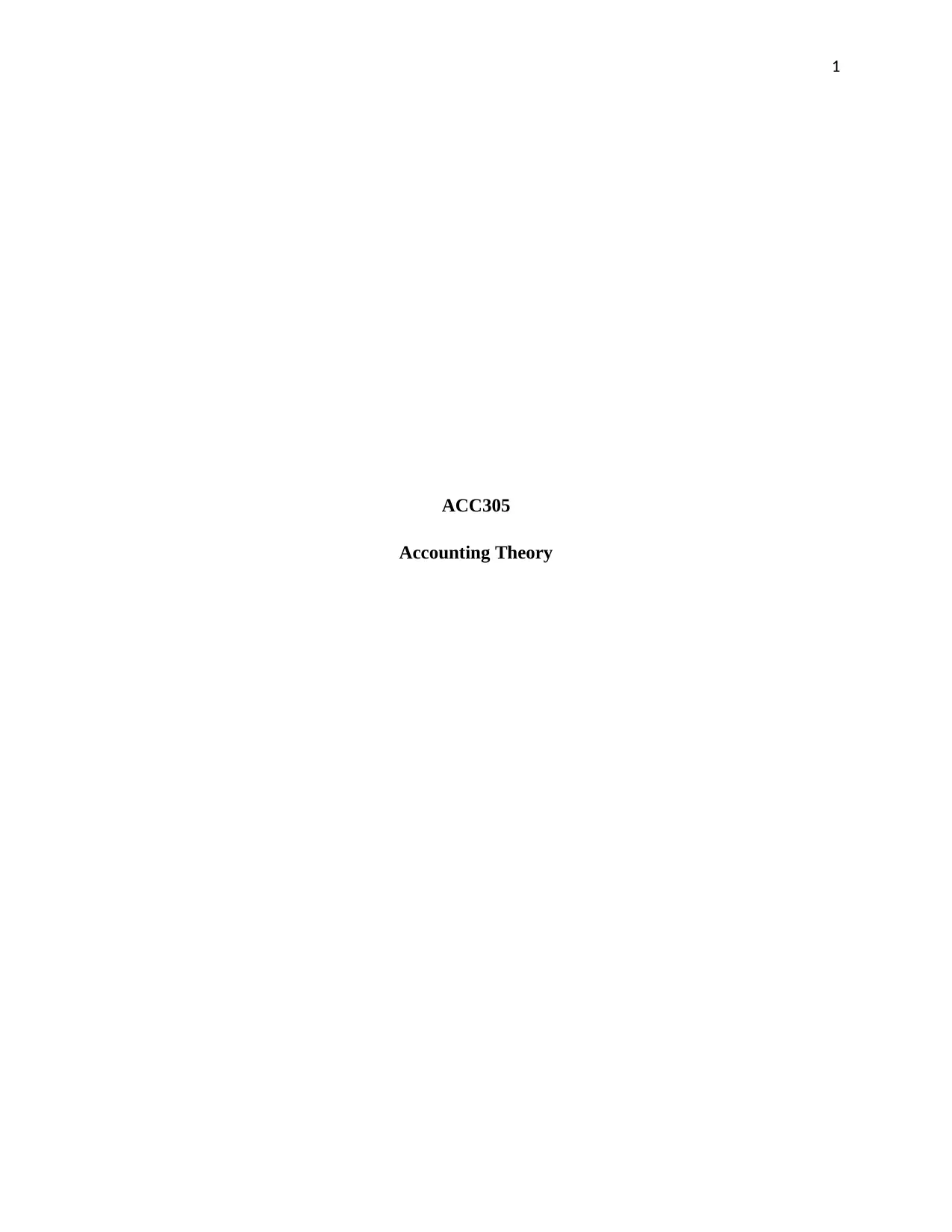
1
ACC305
Accounting Theory
ACC305
Accounting Theory
Paraphrase This Document
Need a fresh take? Get an instant paraphrase of this document with our AI Paraphraser
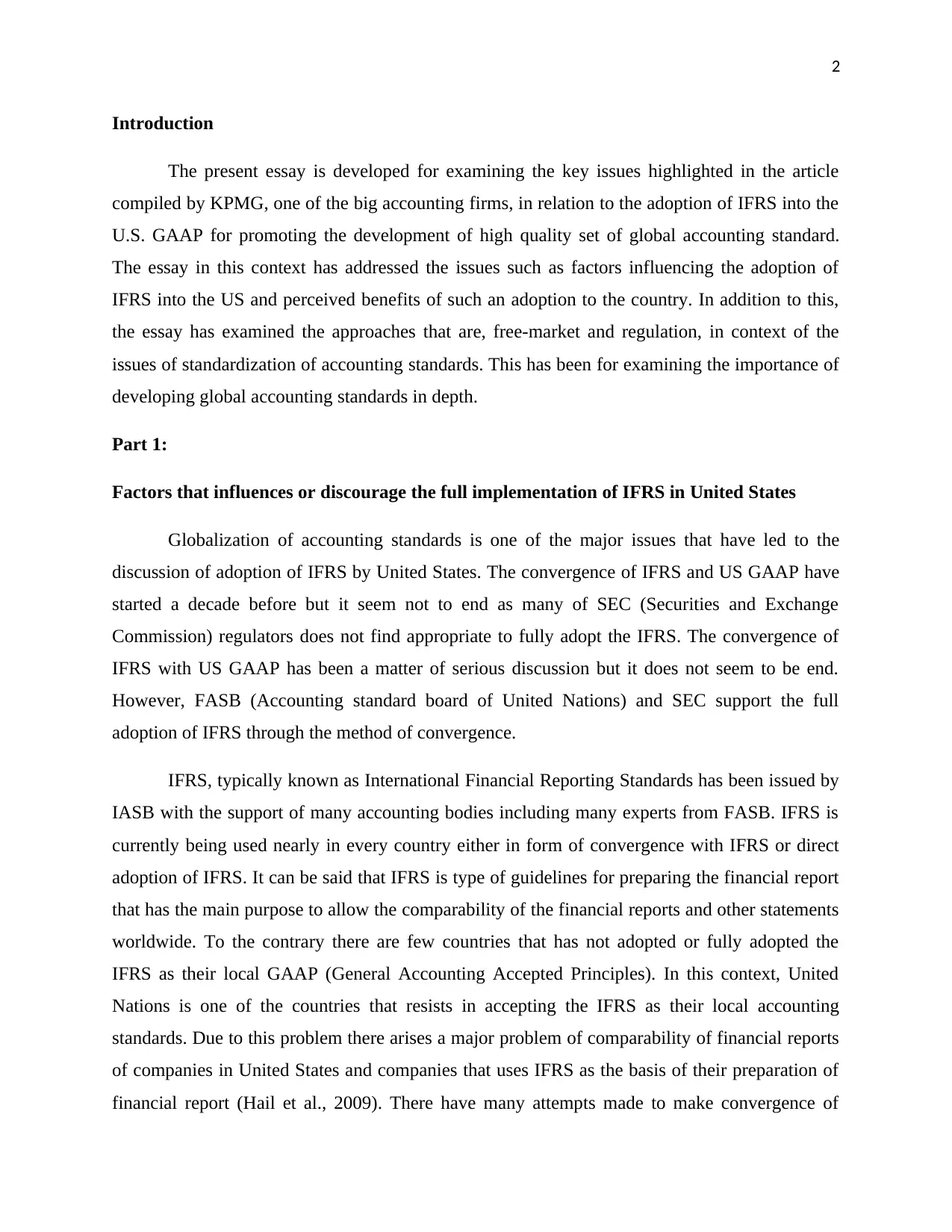
2
Introduction
The present essay is developed for examining the key issues highlighted in the article
compiled by KPMG, one of the big accounting firms, in relation to the adoption of IFRS into the
U.S. GAAP for promoting the development of high quality set of global accounting standard.
The essay in this context has addressed the issues such as factors influencing the adoption of
IFRS into the US and perceived benefits of such an adoption to the country. In addition to this,
the essay has examined the approaches that are, free-market and regulation, in context of the
issues of standardization of accounting standards. This has been for examining the importance of
developing global accounting standards in depth.
Part 1:
Factors that influences or discourage the full implementation of IFRS in United States
Globalization of accounting standards is one of the major issues that have led to the
discussion of adoption of IFRS by United States. The convergence of IFRS and US GAAP have
started a decade before but it seem not to end as many of SEC (Securities and Exchange
Commission) regulators does not find appropriate to fully adopt the IFRS. The convergence of
IFRS with US GAAP has been a matter of serious discussion but it does not seem to be end.
However, FASB (Accounting standard board of United Nations) and SEC support the full
adoption of IFRS through the method of convergence.
IFRS, typically known as International Financial Reporting Standards has been issued by
IASB with the support of many accounting bodies including many experts from FASB. IFRS is
currently being used nearly in every country either in form of convergence with IFRS or direct
adoption of IFRS. It can be said that IFRS is type of guidelines for preparing the financial report
that has the main purpose to allow the comparability of the financial reports and other statements
worldwide. To the contrary there are few countries that has not adopted or fully adopted the
IFRS as their local GAAP (General Accounting Accepted Principles). In this context, United
Nations is one of the countries that resists in accepting the IFRS as their local accounting
standards. Due to this problem there arises a major problem of comparability of financial reports
of companies in United States and companies that uses IFRS as the basis of their preparation of
financial report (Hail et al., 2009). There have many attempts made to make convergence of
Introduction
The present essay is developed for examining the key issues highlighted in the article
compiled by KPMG, one of the big accounting firms, in relation to the adoption of IFRS into the
U.S. GAAP for promoting the development of high quality set of global accounting standard.
The essay in this context has addressed the issues such as factors influencing the adoption of
IFRS into the US and perceived benefits of such an adoption to the country. In addition to this,
the essay has examined the approaches that are, free-market and regulation, in context of the
issues of standardization of accounting standards. This has been for examining the importance of
developing global accounting standards in depth.
Part 1:
Factors that influences or discourage the full implementation of IFRS in United States
Globalization of accounting standards is one of the major issues that have led to the
discussion of adoption of IFRS by United States. The convergence of IFRS and US GAAP have
started a decade before but it seem not to end as many of SEC (Securities and Exchange
Commission) regulators does not find appropriate to fully adopt the IFRS. The convergence of
IFRS with US GAAP has been a matter of serious discussion but it does not seem to be end.
However, FASB (Accounting standard board of United Nations) and SEC support the full
adoption of IFRS through the method of convergence.
IFRS, typically known as International Financial Reporting Standards has been issued by
IASB with the support of many accounting bodies including many experts from FASB. IFRS is
currently being used nearly in every country either in form of convergence with IFRS or direct
adoption of IFRS. It can be said that IFRS is type of guidelines for preparing the financial report
that has the main purpose to allow the comparability of the financial reports and other statements
worldwide. To the contrary there are few countries that has not adopted or fully adopted the
IFRS as their local GAAP (General Accounting Accepted Principles). In this context, United
Nations is one of the countries that resists in accepting the IFRS as their local accounting
standards. Due to this problem there arises a major problem of comparability of financial reports
of companies in United States and companies that uses IFRS as the basis of their preparation of
financial report (Hail et al., 2009). There have many attempts made to make convergence of
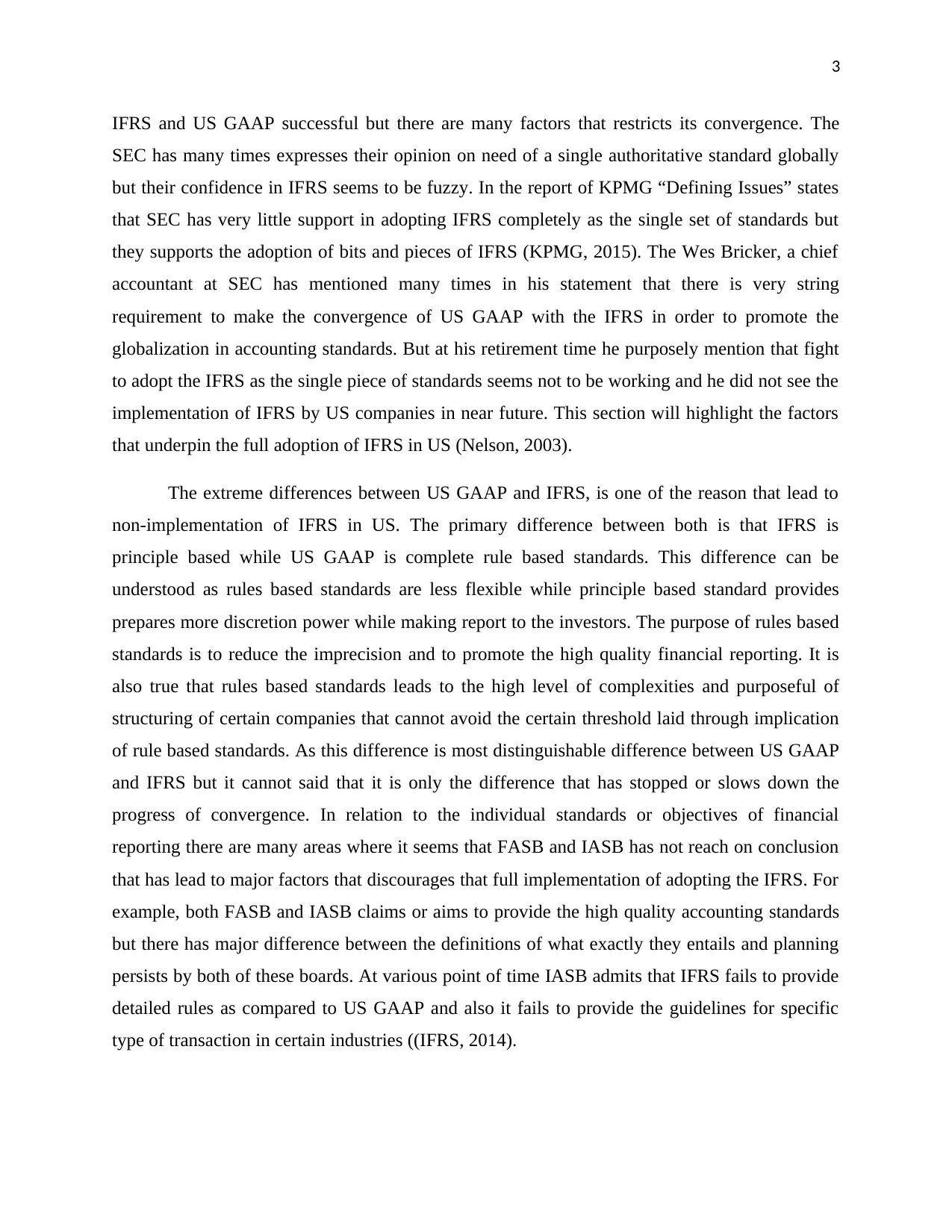
3
IFRS and US GAAP successful but there are many factors that restricts its convergence. The
SEC has many times expresses their opinion on need of a single authoritative standard globally
but their confidence in IFRS seems to be fuzzy. In the report of KPMG “Defining Issues” states
that SEC has very little support in adopting IFRS completely as the single set of standards but
they supports the adoption of bits and pieces of IFRS (KPMG, 2015). The Wes Bricker, a chief
accountant at SEC has mentioned many times in his statement that there is very string
requirement to make the convergence of US GAAP with the IFRS in order to promote the
globalization in accounting standards. But at his retirement time he purposely mention that fight
to adopt the IFRS as the single piece of standards seems not to be working and he did not see the
implementation of IFRS by US companies in near future. This section will highlight the factors
that underpin the full adoption of IFRS in US (Nelson, 2003).
The extreme differences between US GAAP and IFRS, is one of the reason that lead to
non-implementation of IFRS in US. The primary difference between both is that IFRS is
principle based while US GAAP is complete rule based standards. This difference can be
understood as rules based standards are less flexible while principle based standard provides
prepares more discretion power while making report to the investors. The purpose of rules based
standards is to reduce the imprecision and to promote the high quality financial reporting. It is
also true that rules based standards leads to the high level of complexities and purposeful of
structuring of certain companies that cannot avoid the certain threshold laid through implication
of rule based standards. As this difference is most distinguishable difference between US GAAP
and IFRS but it cannot said that it is only the difference that has stopped or slows down the
progress of convergence. In relation to the individual standards or objectives of financial
reporting there are many areas where it seems that FASB and IASB has not reach on conclusion
that has lead to major factors that discourages that full implementation of adopting the IFRS. For
example, both FASB and IASB claims or aims to provide the high quality accounting standards
but there has major difference between the definitions of what exactly they entails and planning
persists by both of these boards. At various point of time IASB admits that IFRS fails to provide
detailed rules as compared to US GAAP and also it fails to provide the guidelines for specific
type of transaction in certain industries ((IFRS, 2014).
IFRS and US GAAP successful but there are many factors that restricts its convergence. The
SEC has many times expresses their opinion on need of a single authoritative standard globally
but their confidence in IFRS seems to be fuzzy. In the report of KPMG “Defining Issues” states
that SEC has very little support in adopting IFRS completely as the single set of standards but
they supports the adoption of bits and pieces of IFRS (KPMG, 2015). The Wes Bricker, a chief
accountant at SEC has mentioned many times in his statement that there is very string
requirement to make the convergence of US GAAP with the IFRS in order to promote the
globalization in accounting standards. But at his retirement time he purposely mention that fight
to adopt the IFRS as the single piece of standards seems not to be working and he did not see the
implementation of IFRS by US companies in near future. This section will highlight the factors
that underpin the full adoption of IFRS in US (Nelson, 2003).
The extreme differences between US GAAP and IFRS, is one of the reason that lead to
non-implementation of IFRS in US. The primary difference between both is that IFRS is
principle based while US GAAP is complete rule based standards. This difference can be
understood as rules based standards are less flexible while principle based standard provides
prepares more discretion power while making report to the investors. The purpose of rules based
standards is to reduce the imprecision and to promote the high quality financial reporting. It is
also true that rules based standards leads to the high level of complexities and purposeful of
structuring of certain companies that cannot avoid the certain threshold laid through implication
of rule based standards. As this difference is most distinguishable difference between US GAAP
and IFRS but it cannot said that it is only the difference that has stopped or slows down the
progress of convergence. In relation to the individual standards or objectives of financial
reporting there are many areas where it seems that FASB and IASB has not reach on conclusion
that has lead to major factors that discourages that full implementation of adopting the IFRS. For
example, both FASB and IASB claims or aims to provide the high quality accounting standards
but there has major difference between the definitions of what exactly they entails and planning
persists by both of these boards. At various point of time IASB admits that IFRS fails to provide
detailed rules as compared to US GAAP and also it fails to provide the guidelines for specific
type of transaction in certain industries ((IFRS, 2014).
⊘ This is a preview!⊘
Do you want full access?
Subscribe today to unlock all pages.

Trusted by 1+ million students worldwide
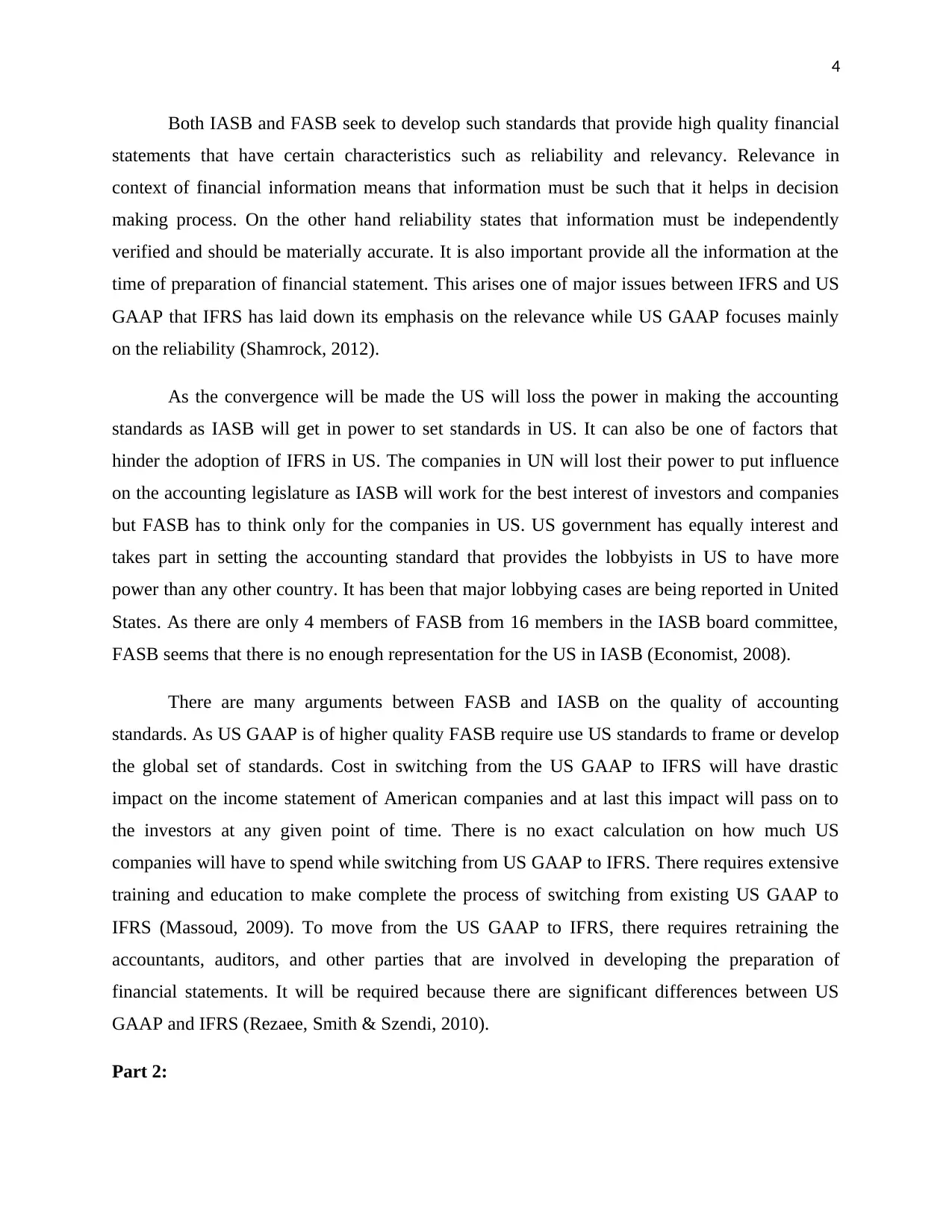
4
Both IASB and FASB seek to develop such standards that provide high quality financial
statements that have certain characteristics such as reliability and relevancy. Relevance in
context of financial information means that information must be such that it helps in decision
making process. On the other hand reliability states that information must be independently
verified and should be materially accurate. It is also important provide all the information at the
time of preparation of financial statement. This arises one of major issues between IFRS and US
GAAP that IFRS has laid down its emphasis on the relevance while US GAAP focuses mainly
on the reliability (Shamrock, 2012).
As the convergence will be made the US will loss the power in making the accounting
standards as IASB will get in power to set standards in US. It can also be one of factors that
hinder the adoption of IFRS in US. The companies in UN will lost their power to put influence
on the accounting legislature as IASB will work for the best interest of investors and companies
but FASB has to think only for the companies in US. US government has equally interest and
takes part in setting the accounting standard that provides the lobbyists in US to have more
power than any other country. It has been that major lobbying cases are being reported in United
States. As there are only 4 members of FASB from 16 members in the IASB board committee,
FASB seems that there is no enough representation for the US in IASB (Economist, 2008).
There are many arguments between FASB and IASB on the quality of accounting
standards. As US GAAP is of higher quality FASB require use US standards to frame or develop
the global set of standards. Cost in switching from the US GAAP to IFRS will have drastic
impact on the income statement of American companies and at last this impact will pass on to
the investors at any given point of time. There is no exact calculation on how much US
companies will have to spend while switching from US GAAP to IFRS. There requires extensive
training and education to make complete the process of switching from existing US GAAP to
IFRS (Massoud, 2009). To move from the US GAAP to IFRS, there requires retraining the
accountants, auditors, and other parties that are involved in developing the preparation of
financial statements. It will be required because there are significant differences between US
GAAP and IFRS (Rezaee, Smith & Szendi, 2010).
Part 2:
Both IASB and FASB seek to develop such standards that provide high quality financial
statements that have certain characteristics such as reliability and relevancy. Relevance in
context of financial information means that information must be such that it helps in decision
making process. On the other hand reliability states that information must be independently
verified and should be materially accurate. It is also important provide all the information at the
time of preparation of financial statement. This arises one of major issues between IFRS and US
GAAP that IFRS has laid down its emphasis on the relevance while US GAAP focuses mainly
on the reliability (Shamrock, 2012).
As the convergence will be made the US will loss the power in making the accounting
standards as IASB will get in power to set standards in US. It can also be one of factors that
hinder the adoption of IFRS in US. The companies in UN will lost their power to put influence
on the accounting legislature as IASB will work for the best interest of investors and companies
but FASB has to think only for the companies in US. US government has equally interest and
takes part in setting the accounting standard that provides the lobbyists in US to have more
power than any other country. It has been that major lobbying cases are being reported in United
States. As there are only 4 members of FASB from 16 members in the IASB board committee,
FASB seems that there is no enough representation for the US in IASB (Economist, 2008).
There are many arguments between FASB and IASB on the quality of accounting
standards. As US GAAP is of higher quality FASB require use US standards to frame or develop
the global set of standards. Cost in switching from the US GAAP to IFRS will have drastic
impact on the income statement of American companies and at last this impact will pass on to
the investors at any given point of time. There is no exact calculation on how much US
companies will have to spend while switching from US GAAP to IFRS. There requires extensive
training and education to make complete the process of switching from existing US GAAP to
IFRS (Massoud, 2009). To move from the US GAAP to IFRS, there requires retraining the
accountants, auditors, and other parties that are involved in developing the preparation of
financial statements. It will be required because there are significant differences between US
GAAP and IFRS (Rezaee, Smith & Szendi, 2010).
Part 2:
Paraphrase This Document
Need a fresh take? Get an instant paraphrase of this document with our AI Paraphraser
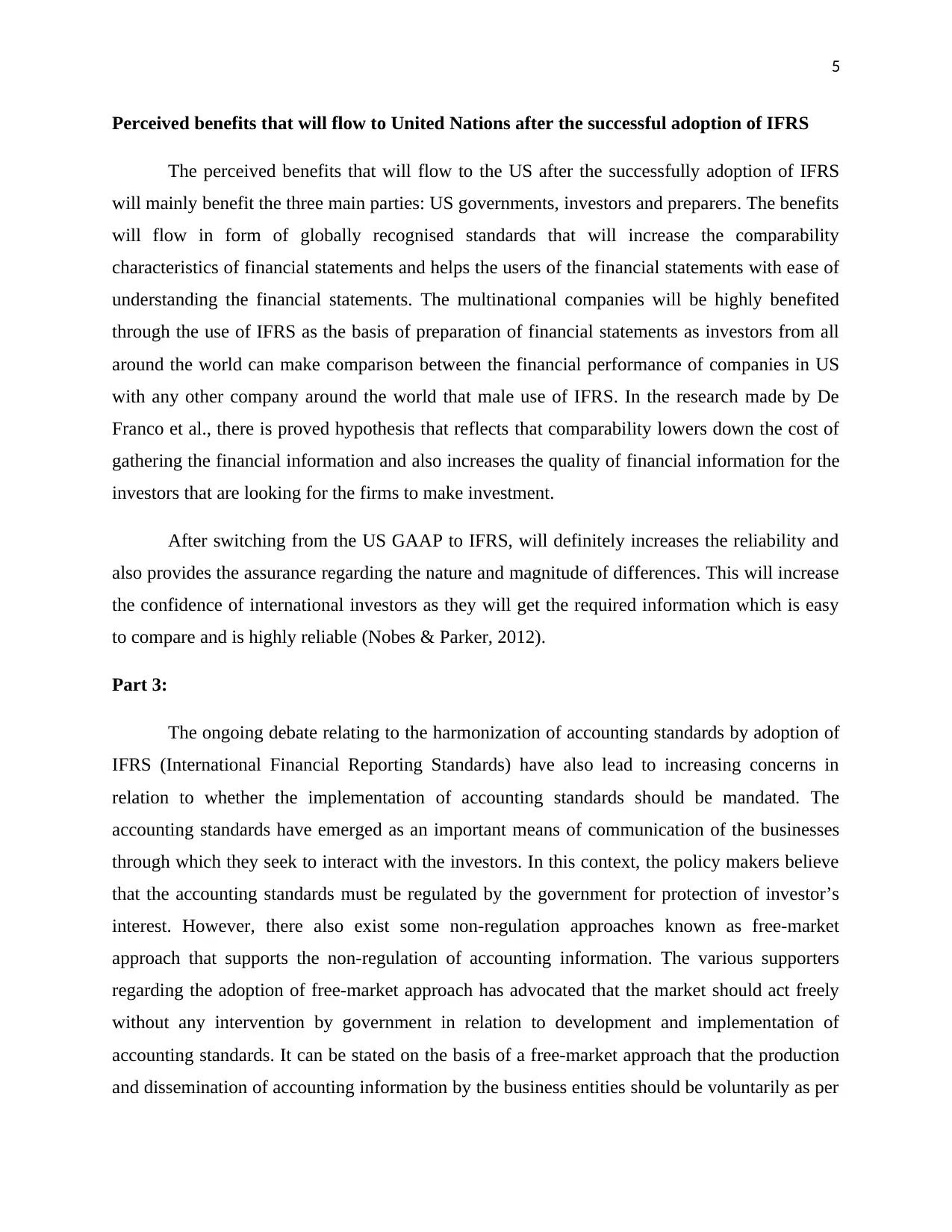
5
Perceived benefits that will flow to United Nations after the successful adoption of IFRS
The perceived benefits that will flow to the US after the successfully adoption of IFRS
will mainly benefit the three main parties: US governments, investors and preparers. The benefits
will flow in form of globally recognised standards that will increase the comparability
characteristics of financial statements and helps the users of the financial statements with ease of
understanding the financial statements. The multinational companies will be highly benefited
through the use of IFRS as the basis of preparation of financial statements as investors from all
around the world can make comparison between the financial performance of companies in US
with any other company around the world that male use of IFRS. In the research made by De
Franco et al., there is proved hypothesis that reflects that comparability lowers down the cost of
gathering the financial information and also increases the quality of financial information for the
investors that are looking for the firms to make investment.
After switching from the US GAAP to IFRS, will definitely increases the reliability and
also provides the assurance regarding the nature and magnitude of differences. This will increase
the confidence of international investors as they will get the required information which is easy
to compare and is highly reliable (Nobes & Parker, 2012).
Part 3:
The ongoing debate relating to the harmonization of accounting standards by adoption of
IFRS (International Financial Reporting Standards) have also lead to increasing concerns in
relation to whether the implementation of accounting standards should be mandated. The
accounting standards have emerged as an important means of communication of the businesses
through which they seek to interact with the investors. In this context, the policy makers believe
that the accounting standards must be regulated by the government for protection of investor’s
interest. However, there also exist some non-regulation approaches known as free-market
approach that supports the non-regulation of accounting information. The various supporters
regarding the adoption of free-market approach has advocated that the market should act freely
without any intervention by government in relation to development and implementation of
accounting standards. It can be stated on the basis of a free-market approach that the production
and dissemination of accounting information by the business entities should be voluntarily as per
Perceived benefits that will flow to United Nations after the successful adoption of IFRS
The perceived benefits that will flow to the US after the successfully adoption of IFRS
will mainly benefit the three main parties: US governments, investors and preparers. The benefits
will flow in form of globally recognised standards that will increase the comparability
characteristics of financial statements and helps the users of the financial statements with ease of
understanding the financial statements. The multinational companies will be highly benefited
through the use of IFRS as the basis of preparation of financial statements as investors from all
around the world can make comparison between the financial performance of companies in US
with any other company around the world that male use of IFRS. In the research made by De
Franco et al., there is proved hypothesis that reflects that comparability lowers down the cost of
gathering the financial information and also increases the quality of financial information for the
investors that are looking for the firms to make investment.
After switching from the US GAAP to IFRS, will definitely increases the reliability and
also provides the assurance regarding the nature and magnitude of differences. This will increase
the confidence of international investors as they will get the required information which is easy
to compare and is highly reliable (Nobes & Parker, 2012).
Part 3:
The ongoing debate relating to the harmonization of accounting standards by adoption of
IFRS (International Financial Reporting Standards) have also lead to increasing concerns in
relation to whether the implementation of accounting standards should be mandated. The
accounting standards have emerged as an important means of communication of the businesses
through which they seek to interact with the investors. In this context, the policy makers believe
that the accounting standards must be regulated by the government for protection of investor’s
interest. However, there also exist some non-regulation approaches known as free-market
approach that supports the non-regulation of accounting information. The various supporters
regarding the adoption of free-market approach has advocated that the market should act freely
without any intervention by government in relation to development and implementation of
accounting standards. It can be stated on the basis of a free-market approach that the production
and dissemination of accounting information by the business entities should be voluntarily as per
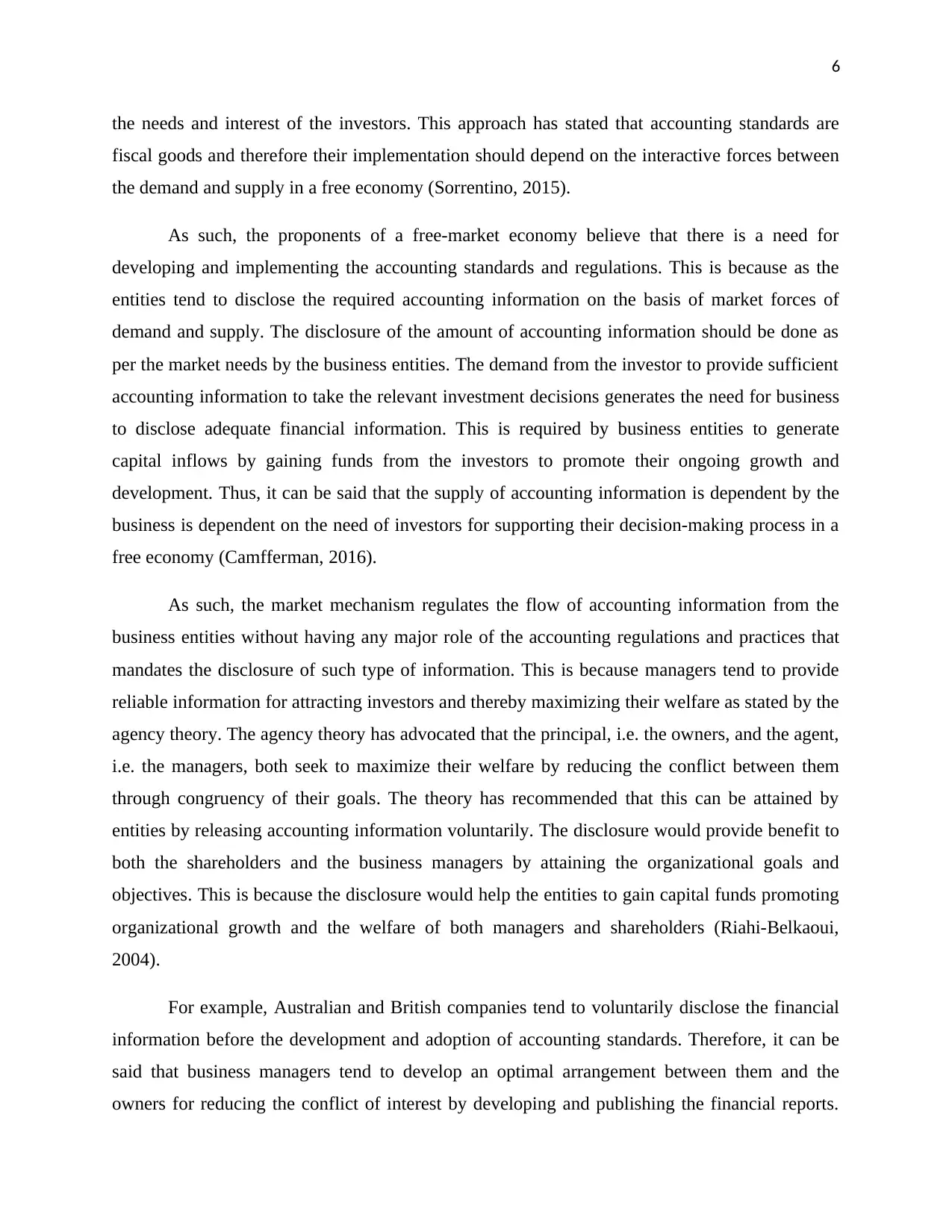
6
the needs and interest of the investors. This approach has stated that accounting standards are
fiscal goods and therefore their implementation should depend on the interactive forces between
the demand and supply in a free economy (Sorrentino, 2015).
As such, the proponents of a free-market economy believe that there is a need for
developing and implementing the accounting standards and regulations. This is because as the
entities tend to disclose the required accounting information on the basis of market forces of
demand and supply. The disclosure of the amount of accounting information should be done as
per the market needs by the business entities. The demand from the investor to provide sufficient
accounting information to take the relevant investment decisions generates the need for business
to disclose adequate financial information. This is required by business entities to generate
capital inflows by gaining funds from the investors to promote their ongoing growth and
development. Thus, it can be said that the supply of accounting information is dependent by the
business is dependent on the need of investors for supporting their decision-making process in a
free economy (Camfferman, 2016).
As such, the market mechanism regulates the flow of accounting information from the
business entities without having any major role of the accounting regulations and practices that
mandates the disclosure of such type of information. This is because managers tend to provide
reliable information for attracting investors and thereby maximizing their welfare as stated by the
agency theory. The agency theory has advocated that the principal, i.e. the owners, and the agent,
i.e. the managers, both seek to maximize their welfare by reducing the conflict between them
through congruency of their goals. The theory has recommended that this can be attained by
entities by releasing accounting information voluntarily. The disclosure would provide benefit to
both the shareholders and the business managers by attaining the organizational goals and
objectives. This is because the disclosure would help the entities to gain capital funds promoting
organizational growth and the welfare of both managers and shareholders (Riahi-Belkaoui,
2004).
For example, Australian and British companies tend to voluntarily disclose the financial
information before the development and adoption of accounting standards. Therefore, it can be
said that business managers tend to develop an optimal arrangement between them and the
owners for reducing the conflict of interest by developing and publishing the financial reports.
the needs and interest of the investors. This approach has stated that accounting standards are
fiscal goods and therefore their implementation should depend on the interactive forces between
the demand and supply in a free economy (Sorrentino, 2015).
As such, the proponents of a free-market economy believe that there is a need for
developing and implementing the accounting standards and regulations. This is because as the
entities tend to disclose the required accounting information on the basis of market forces of
demand and supply. The disclosure of the amount of accounting information should be done as
per the market needs by the business entities. The demand from the investor to provide sufficient
accounting information to take the relevant investment decisions generates the need for business
to disclose adequate financial information. This is required by business entities to generate
capital inflows by gaining funds from the investors to promote their ongoing growth and
development. Thus, it can be said that the supply of accounting information is dependent by the
business is dependent on the need of investors for supporting their decision-making process in a
free economy (Camfferman, 2016).
As such, the market mechanism regulates the flow of accounting information from the
business entities without having any major role of the accounting regulations and practices that
mandates the disclosure of such type of information. This is because managers tend to provide
reliable information for attracting investors and thereby maximizing their welfare as stated by the
agency theory. The agency theory has advocated that the principal, i.e. the owners, and the agent,
i.e. the managers, both seek to maximize their welfare by reducing the conflict between them
through congruency of their goals. The theory has recommended that this can be attained by
entities by releasing accounting information voluntarily. The disclosure would provide benefit to
both the shareholders and the business managers by attaining the organizational goals and
objectives. This is because the disclosure would help the entities to gain capital funds promoting
organizational growth and the welfare of both managers and shareholders (Riahi-Belkaoui,
2004).
For example, Australian and British companies tend to voluntarily disclose the financial
information before the development and adoption of accounting standards. Therefore, it can be
said that business managers tend to develop an optimal arrangement between them and the
owners for reducing the conflict of interest by developing and publishing the financial reports.
⊘ This is a preview!⊘
Do you want full access?
Subscribe today to unlock all pages.

Trusted by 1+ million students worldwide
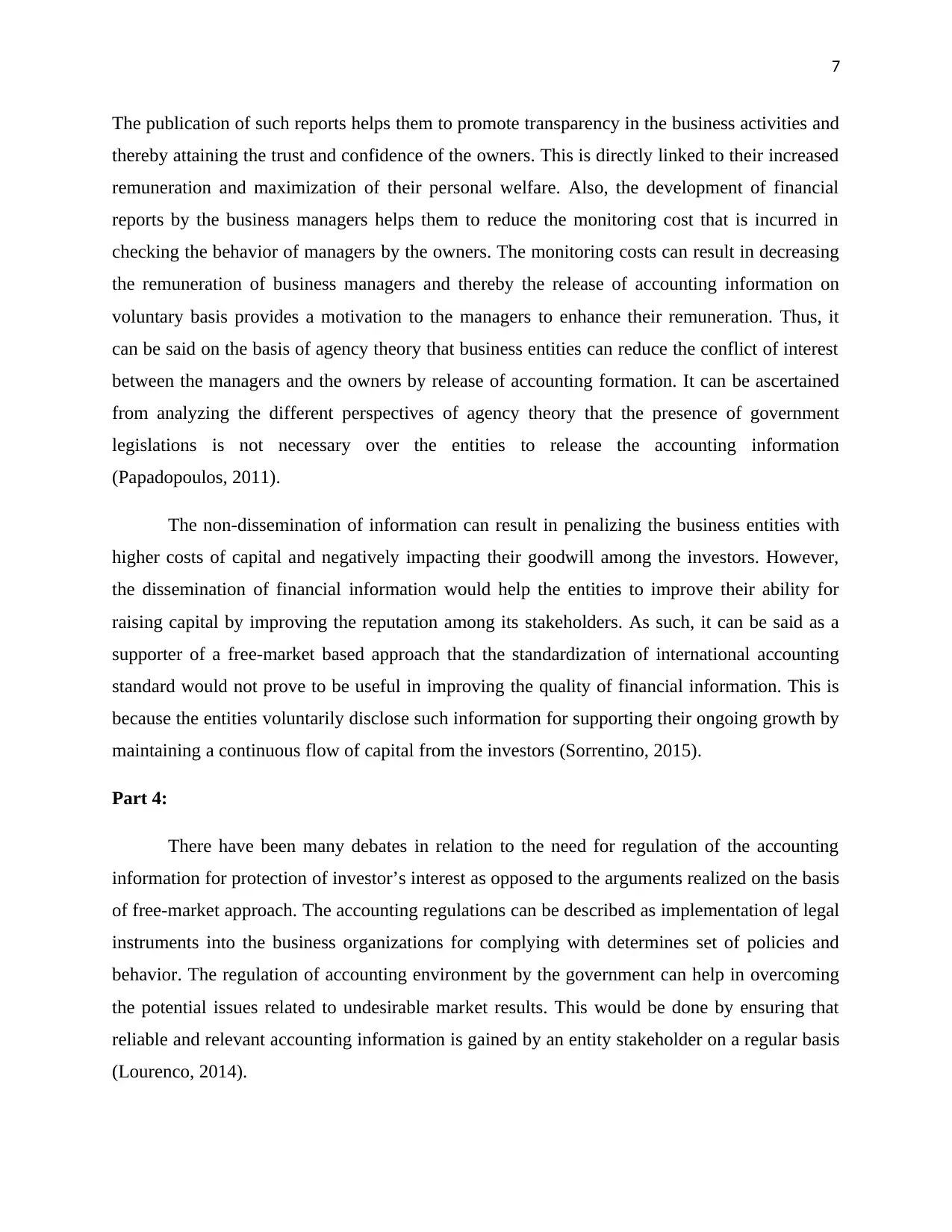
7
The publication of such reports helps them to promote transparency in the business activities and
thereby attaining the trust and confidence of the owners. This is directly linked to their increased
remuneration and maximization of their personal welfare. Also, the development of financial
reports by the business managers helps them to reduce the monitoring cost that is incurred in
checking the behavior of managers by the owners. The monitoring costs can result in decreasing
the remuneration of business managers and thereby the release of accounting information on
voluntary basis provides a motivation to the managers to enhance their remuneration. Thus, it
can be said on the basis of agency theory that business entities can reduce the conflict of interest
between the managers and the owners by release of accounting formation. It can be ascertained
from analyzing the different perspectives of agency theory that the presence of government
legislations is not necessary over the entities to release the accounting information
(Papadopoulos, 2011).
The non-dissemination of information can result in penalizing the business entities with
higher costs of capital and negatively impacting their goodwill among the investors. However,
the dissemination of financial information would help the entities to improve their ability for
raising capital by improving the reputation among its stakeholders. As such, it can be said as a
supporter of a free-market based approach that the standardization of international accounting
standard would not prove to be useful in improving the quality of financial information. This is
because the entities voluntarily disclose such information for supporting their ongoing growth by
maintaining a continuous flow of capital from the investors (Sorrentino, 2015).
Part 4:
There have been many debates in relation to the need for regulation of the accounting
information for protection of investor’s interest as opposed to the arguments realized on the basis
of free-market approach. The accounting regulations can be described as implementation of legal
instruments into the business organizations for complying with determines set of policies and
behavior. The regulation of accounting environment by the government can help in overcoming
the potential issues related to undesirable market results. This would be done by ensuring that
reliable and relevant accounting information is gained by an entity stakeholder on a regular basis
(Lourenco, 2014).
The publication of such reports helps them to promote transparency in the business activities and
thereby attaining the trust and confidence of the owners. This is directly linked to their increased
remuneration and maximization of their personal welfare. Also, the development of financial
reports by the business managers helps them to reduce the monitoring cost that is incurred in
checking the behavior of managers by the owners. The monitoring costs can result in decreasing
the remuneration of business managers and thereby the release of accounting information on
voluntary basis provides a motivation to the managers to enhance their remuneration. Thus, it
can be said on the basis of agency theory that business entities can reduce the conflict of interest
between the managers and the owners by release of accounting formation. It can be ascertained
from analyzing the different perspectives of agency theory that the presence of government
legislations is not necessary over the entities to release the accounting information
(Papadopoulos, 2011).
The non-dissemination of information can result in penalizing the business entities with
higher costs of capital and negatively impacting their goodwill among the investors. However,
the dissemination of financial information would help the entities to improve their ability for
raising capital by improving the reputation among its stakeholders. As such, it can be said as a
supporter of a free-market based approach that the standardization of international accounting
standard would not prove to be useful in improving the quality of financial information. This is
because the entities voluntarily disclose such information for supporting their ongoing growth by
maintaining a continuous flow of capital from the investors (Sorrentino, 2015).
Part 4:
There have been many debates in relation to the need for regulation of the accounting
information for protection of investor’s interest as opposed to the arguments realized on the basis
of free-market approach. The accounting regulations can be described as implementation of legal
instruments into the business organizations for complying with determines set of policies and
behavior. The regulation of accounting environment by the government can help in overcoming
the potential issues related to undesirable market results. This would be done by ensuring that
reliable and relevant accounting information is gained by an entity stakeholder on a regular basis
(Lourenco, 2014).
Paraphrase This Document
Need a fresh take? Get an instant paraphrase of this document with our AI Paraphraser
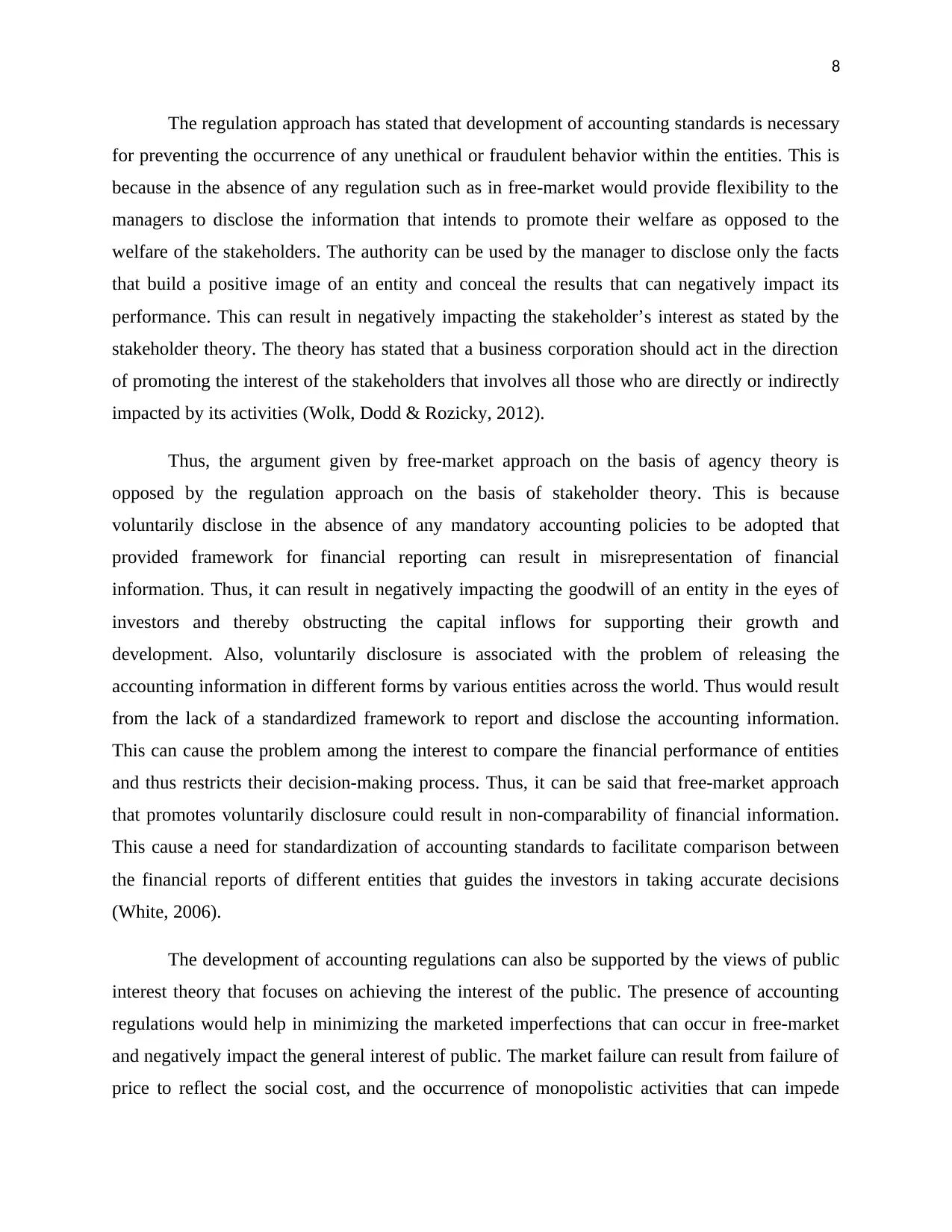
8
The regulation approach has stated that development of accounting standards is necessary
for preventing the occurrence of any unethical or fraudulent behavior within the entities. This is
because in the absence of any regulation such as in free-market would provide flexibility to the
managers to disclose the information that intends to promote their welfare as opposed to the
welfare of the stakeholders. The authority can be used by the manager to disclose only the facts
that build a positive image of an entity and conceal the results that can negatively impact its
performance. This can result in negatively impacting the stakeholder’s interest as stated by the
stakeholder theory. The theory has stated that a business corporation should act in the direction
of promoting the interest of the stakeholders that involves all those who are directly or indirectly
impacted by its activities (Wolk, Dodd & Rozicky, 2012).
Thus, the argument given by free-market approach on the basis of agency theory is
opposed by the regulation approach on the basis of stakeholder theory. This is because
voluntarily disclose in the absence of any mandatory accounting policies to be adopted that
provided framework for financial reporting can result in misrepresentation of financial
information. Thus, it can result in negatively impacting the goodwill of an entity in the eyes of
investors and thereby obstructing the capital inflows for supporting their growth and
development. Also, voluntarily disclosure is associated with the problem of releasing the
accounting information in different forms by various entities across the world. Thus would result
from the lack of a standardized framework to report and disclose the accounting information.
This can cause the problem among the interest to compare the financial performance of entities
and thus restricts their decision-making process. Thus, it can be said that free-market approach
that promotes voluntarily disclosure could result in non-comparability of financial information.
This cause a need for standardization of accounting standards to facilitate comparison between
the financial reports of different entities that guides the investors in taking accurate decisions
(White, 2006).
The development of accounting regulations can also be supported by the views of public
interest theory that focuses on achieving the interest of the public. The presence of accounting
regulations would help in minimizing the marketed imperfections that can occur in free-market
and negatively impact the general interest of public. The market failure can result from failure of
price to reflect the social cost, and the occurrence of monopolistic activities that can impede
The regulation approach has stated that development of accounting standards is necessary
for preventing the occurrence of any unethical or fraudulent behavior within the entities. This is
because in the absence of any regulation such as in free-market would provide flexibility to the
managers to disclose the information that intends to promote their welfare as opposed to the
welfare of the stakeholders. The authority can be used by the manager to disclose only the facts
that build a positive image of an entity and conceal the results that can negatively impact its
performance. This can result in negatively impacting the stakeholder’s interest as stated by the
stakeholder theory. The theory has stated that a business corporation should act in the direction
of promoting the interest of the stakeholders that involves all those who are directly or indirectly
impacted by its activities (Wolk, Dodd & Rozicky, 2012).
Thus, the argument given by free-market approach on the basis of agency theory is
opposed by the regulation approach on the basis of stakeholder theory. This is because
voluntarily disclose in the absence of any mandatory accounting policies to be adopted that
provided framework for financial reporting can result in misrepresentation of financial
information. Thus, it can result in negatively impacting the goodwill of an entity in the eyes of
investors and thereby obstructing the capital inflows for supporting their growth and
development. Also, voluntarily disclosure is associated with the problem of releasing the
accounting information in different forms by various entities across the world. Thus would result
from the lack of a standardized framework to report and disclose the accounting information.
This can cause the problem among the interest to compare the financial performance of entities
and thus restricts their decision-making process. Thus, it can be said that free-market approach
that promotes voluntarily disclosure could result in non-comparability of financial information.
This cause a need for standardization of accounting standards to facilitate comparison between
the financial reports of different entities that guides the investors in taking accurate decisions
(White, 2006).
The development of accounting regulations can also be supported by the views of public
interest theory that focuses on achieving the interest of the public. The presence of accounting
regulations would help in minimizing the marketed imperfections that can occur in free-market
and negatively impact the general interest of public. The market failure can result from failure of
price to reflect the social cost, and the occurrence of monopolistic activities that can impede
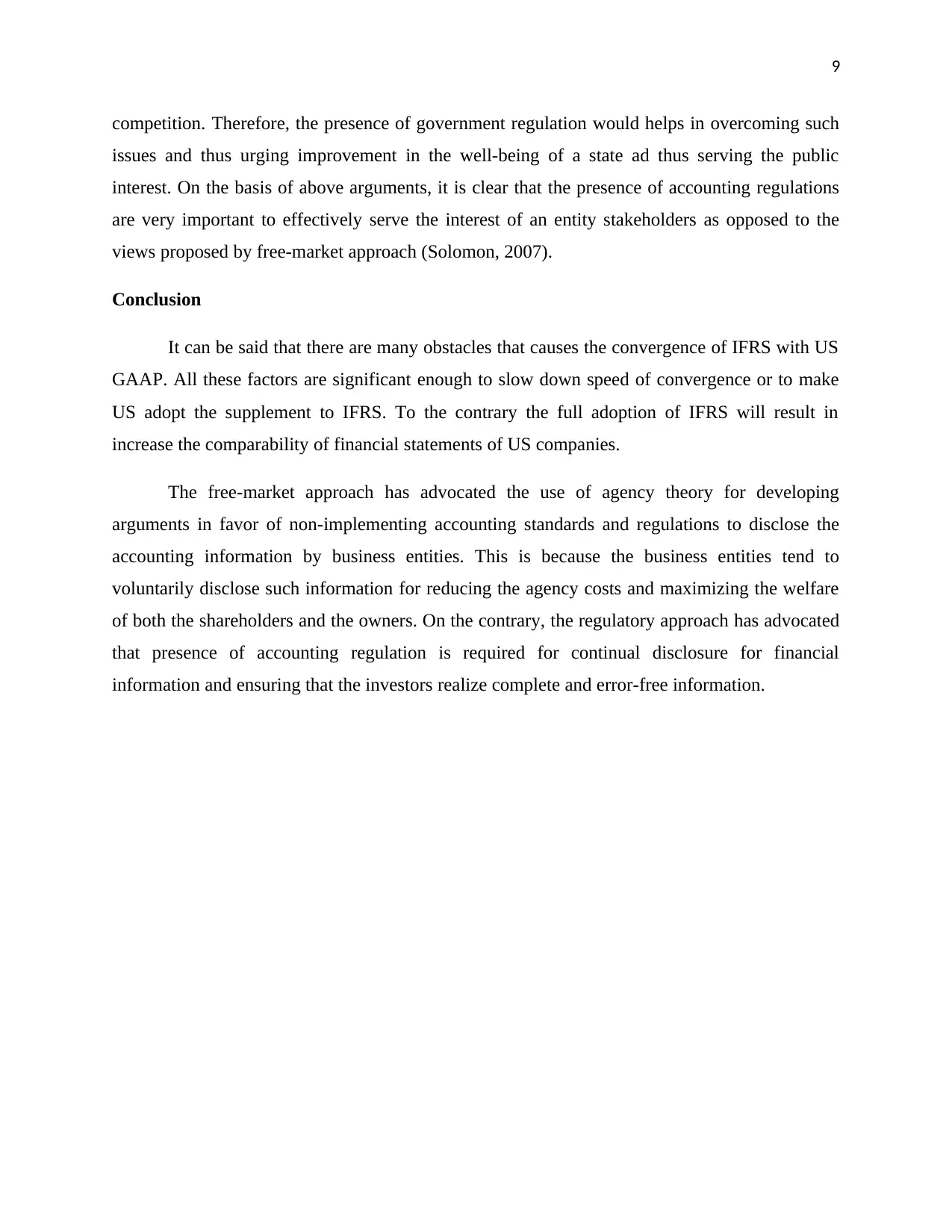
9
competition. Therefore, the presence of government regulation would helps in overcoming such
issues and thus urging improvement in the well-being of a state ad thus serving the public
interest. On the basis of above arguments, it is clear that the presence of accounting regulations
are very important to effectively serve the interest of an entity stakeholders as opposed to the
views proposed by free-market approach (Solomon, 2007).
Conclusion
It can be said that there are many obstacles that causes the convergence of IFRS with US
GAAP. All these factors are significant enough to slow down speed of convergence or to make
US adopt the supplement to IFRS. To the contrary the full adoption of IFRS will result in
increase the comparability of financial statements of US companies.
The free-market approach has advocated the use of agency theory for developing
arguments in favor of non-implementing accounting standards and regulations to disclose the
accounting information by business entities. This is because the business entities tend to
voluntarily disclose such information for reducing the agency costs and maximizing the welfare
of both the shareholders and the owners. On the contrary, the regulatory approach has advocated
that presence of accounting regulation is required for continual disclosure for financial
information and ensuring that the investors realize complete and error-free information.
competition. Therefore, the presence of government regulation would helps in overcoming such
issues and thus urging improvement in the well-being of a state ad thus serving the public
interest. On the basis of above arguments, it is clear that the presence of accounting regulations
are very important to effectively serve the interest of an entity stakeholders as opposed to the
views proposed by free-market approach (Solomon, 2007).
Conclusion
It can be said that there are many obstacles that causes the convergence of IFRS with US
GAAP. All these factors are significant enough to slow down speed of convergence or to make
US adopt the supplement to IFRS. To the contrary the full adoption of IFRS will result in
increase the comparability of financial statements of US companies.
The free-market approach has advocated the use of agency theory for developing
arguments in favor of non-implementing accounting standards and regulations to disclose the
accounting information by business entities. This is because the business entities tend to
voluntarily disclose such information for reducing the agency costs and maximizing the welfare
of both the shareholders and the owners. On the contrary, the regulatory approach has advocated
that presence of accounting regulation is required for continual disclosure for financial
information and ensuring that the investors realize complete and error-free information.
⊘ This is a preview!⊘
Do you want full access?
Subscribe today to unlock all pages.

Trusted by 1+ million students worldwide
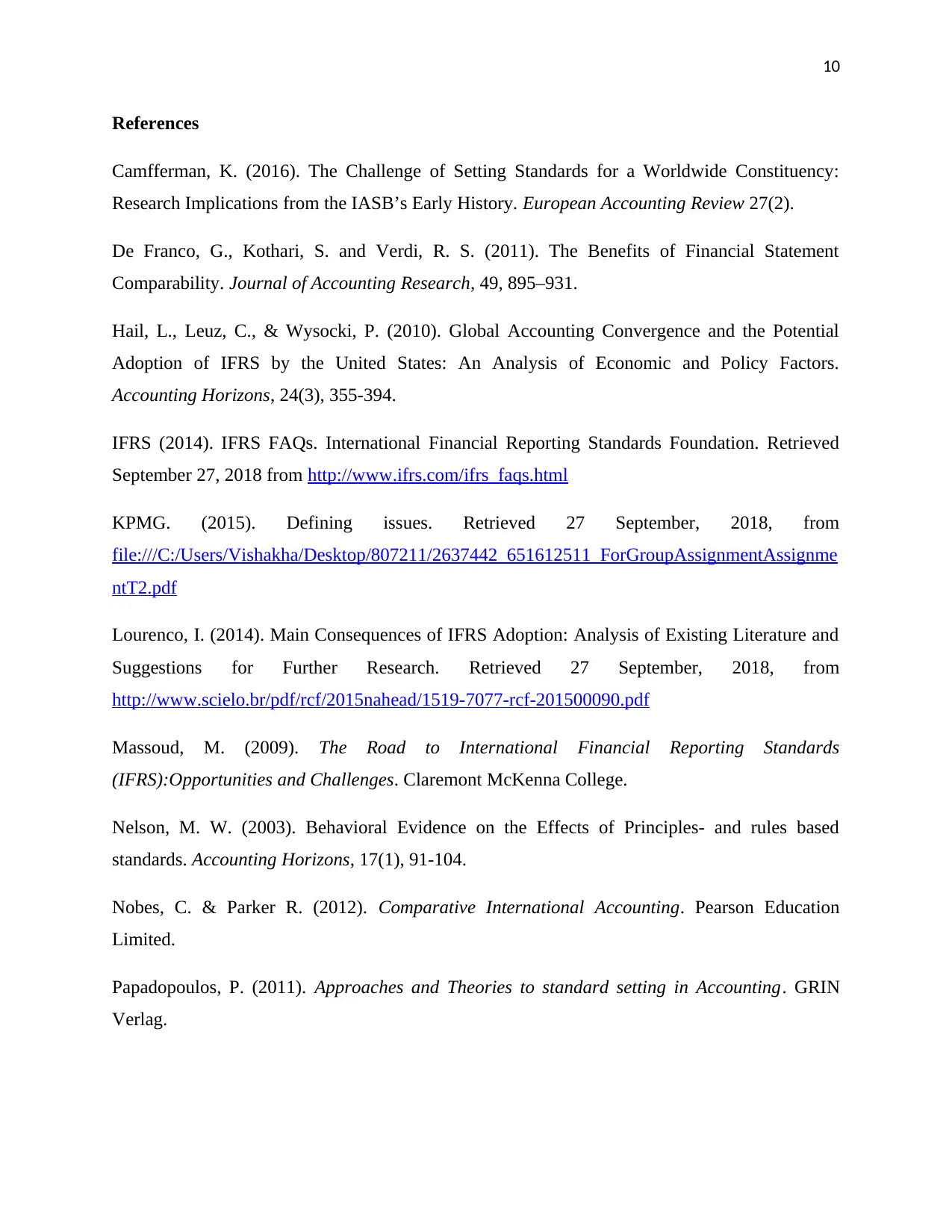
10
References
Camfferman, K. (2016). The Challenge of Setting Standards for a Worldwide Constituency:
Research Implications from the IASB’s Early History. European Accounting Review 27(2).
De Franco, G., Kothari, S. and Verdi, R. S. (2011). The Benefits of Financial Statement
Comparability. Journal of Accounting Research, 49, 895–931.
Hail, L., Leuz, C., & Wysocki, P. (2010). Global Accounting Convergence and the Potential
Adoption of IFRS by the United States: An Analysis of Economic and Policy Factors.
Accounting Horizons, 24(3), 355-394.
IFRS (2014). IFRS FAQs. International Financial Reporting Standards Foundation. Retrieved
September 27, 2018 from http://www.ifrs.com/ifrs_faqs.html
KPMG. (2015). Defining issues. Retrieved 27 September, 2018, from
file:///C:/Users/Vishakha/Desktop/807211/2637442_651612511_ForGroupAssignmentAssignme
ntT2.pdf
Lourenco, I. (2014). Main Consequences of IFRS Adoption: Analysis of Existing Literature and
Suggestions for Further Research. Retrieved 27 September, 2018, from
http://www.scielo.br/pdf/rcf/2015nahead/1519-7077-rcf-201500090.pdf
Massoud, M. (2009). The Road to International Financial Reporting Standards
(IFRS):Opportunities and Challenges. Claremont McKenna College.
Nelson, M. W. (2003). Behavioral Evidence on the Effects of Principles- and rules based
standards. Accounting Horizons, 17(1), 91-104.
Nobes, C. & Parker R. (2012). Comparative International Accounting. Pearson Education
Limited.
Papadopoulos, P. (2011). Approaches and Theories to standard setting in Accounting. GRIN
Verlag.
References
Camfferman, K. (2016). The Challenge of Setting Standards for a Worldwide Constituency:
Research Implications from the IASB’s Early History. European Accounting Review 27(2).
De Franco, G., Kothari, S. and Verdi, R. S. (2011). The Benefits of Financial Statement
Comparability. Journal of Accounting Research, 49, 895–931.
Hail, L., Leuz, C., & Wysocki, P. (2010). Global Accounting Convergence and the Potential
Adoption of IFRS by the United States: An Analysis of Economic and Policy Factors.
Accounting Horizons, 24(3), 355-394.
IFRS (2014). IFRS FAQs. International Financial Reporting Standards Foundation. Retrieved
September 27, 2018 from http://www.ifrs.com/ifrs_faqs.html
KPMG. (2015). Defining issues. Retrieved 27 September, 2018, from
file:///C:/Users/Vishakha/Desktop/807211/2637442_651612511_ForGroupAssignmentAssignme
ntT2.pdf
Lourenco, I. (2014). Main Consequences of IFRS Adoption: Analysis of Existing Literature and
Suggestions for Further Research. Retrieved 27 September, 2018, from
http://www.scielo.br/pdf/rcf/2015nahead/1519-7077-rcf-201500090.pdf
Massoud, M. (2009). The Road to International Financial Reporting Standards
(IFRS):Opportunities and Challenges. Claremont McKenna College.
Nelson, M. W. (2003). Behavioral Evidence on the Effects of Principles- and rules based
standards. Accounting Horizons, 17(1), 91-104.
Nobes, C. & Parker R. (2012). Comparative International Accounting. Pearson Education
Limited.
Papadopoulos, P. (2011). Approaches and Theories to standard setting in Accounting. GRIN
Verlag.
Paraphrase This Document
Need a fresh take? Get an instant paraphrase of this document with our AI Paraphraser
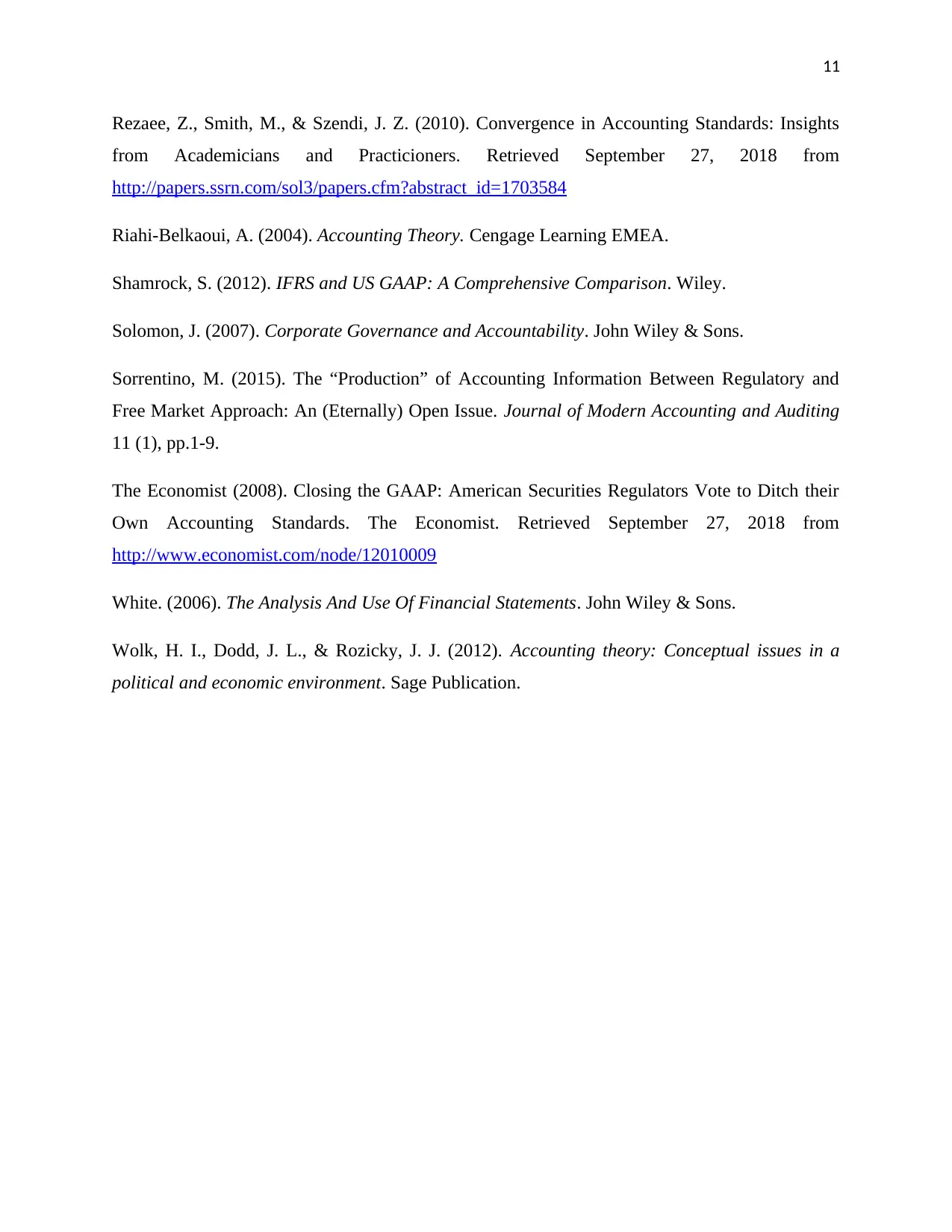
11
Rezaee, Z., Smith, M., & Szendi, J. Z. (2010). Convergence in Accounting Standards: Insights
from Academicians and Practicioners. Retrieved September 27, 2018 from
http://papers.ssrn.com/sol3/papers.cfm?abstract_id=1703584
Riahi-Belkaoui, A. (2004). Accounting Theory. Cengage Learning EMEA.
Shamrock, S. (2012). IFRS and US GAAP: A Comprehensive Comparison. Wiley.
Solomon, J. (2007). Corporate Governance and Accountability. John Wiley & Sons.
Sorrentino, M. (2015). The “Production” of Accounting Information Between Regulatory and
Free Market Approach: An (Eternally) Open Issue. Journal of Modern Accounting and Auditing
11 (1), pp.1-9.
The Economist (2008). Closing the GAAP: American Securities Regulators Vote to Ditch their
Own Accounting Standards. The Economist. Retrieved September 27, 2018 from
http://www.economist.com/node/12010009
White. (2006). The Analysis And Use Of Financial Statements. John Wiley & Sons.
Wolk, H. I., Dodd, J. L., & Rozicky, J. J. (2012). Accounting theory: Conceptual issues in a
political and economic environment. Sage Publication.
Rezaee, Z., Smith, M., & Szendi, J. Z. (2010). Convergence in Accounting Standards: Insights
from Academicians and Practicioners. Retrieved September 27, 2018 from
http://papers.ssrn.com/sol3/papers.cfm?abstract_id=1703584
Riahi-Belkaoui, A. (2004). Accounting Theory. Cengage Learning EMEA.
Shamrock, S. (2012). IFRS and US GAAP: A Comprehensive Comparison. Wiley.
Solomon, J. (2007). Corporate Governance and Accountability. John Wiley & Sons.
Sorrentino, M. (2015). The “Production” of Accounting Information Between Regulatory and
Free Market Approach: An (Eternally) Open Issue. Journal of Modern Accounting and Auditing
11 (1), pp.1-9.
The Economist (2008). Closing the GAAP: American Securities Regulators Vote to Ditch their
Own Accounting Standards. The Economist. Retrieved September 27, 2018 from
http://www.economist.com/node/12010009
White. (2006). The Analysis And Use Of Financial Statements. John Wiley & Sons.
Wolk, H. I., Dodd, J. L., & Rozicky, J. J. (2012). Accounting theory: Conceptual issues in a
political and economic environment. Sage Publication.
1 out of 11
Related Documents
Your All-in-One AI-Powered Toolkit for Academic Success.
+13062052269
info@desklib.com
Available 24*7 on WhatsApp / Email
![[object Object]](/_next/static/media/star-bottom.7253800d.svg)
Unlock your academic potential
Copyright © 2020–2026 A2Z Services. All Rights Reserved. Developed and managed by ZUCOL.





